NCERT Solutions for Class 10 Civics Chapter 5 – Outcomes of Democracy
NCERT Solutions for Class 10 Civics Chapter 5 – Outcomes of Democracy are essential for evaluating the real-life performance of democracy as taught in the CBSE curriculum. These well-structured answers help students grasp topics like accountable governance, reduction of inequality, political participation, and economic growth under democratic regimes. Designed as per the latest syllabus, these solutions strengthen conceptual clarity and improve exam preparation. Ideal for revision and practice, they promote analytical thinking and civic judgment, making them a valuable study tool for scoring well in Class 10 Social Science exams.
NCERT Solutions For Class 10 Civics – Outcomes of Democracy – Exercise Images
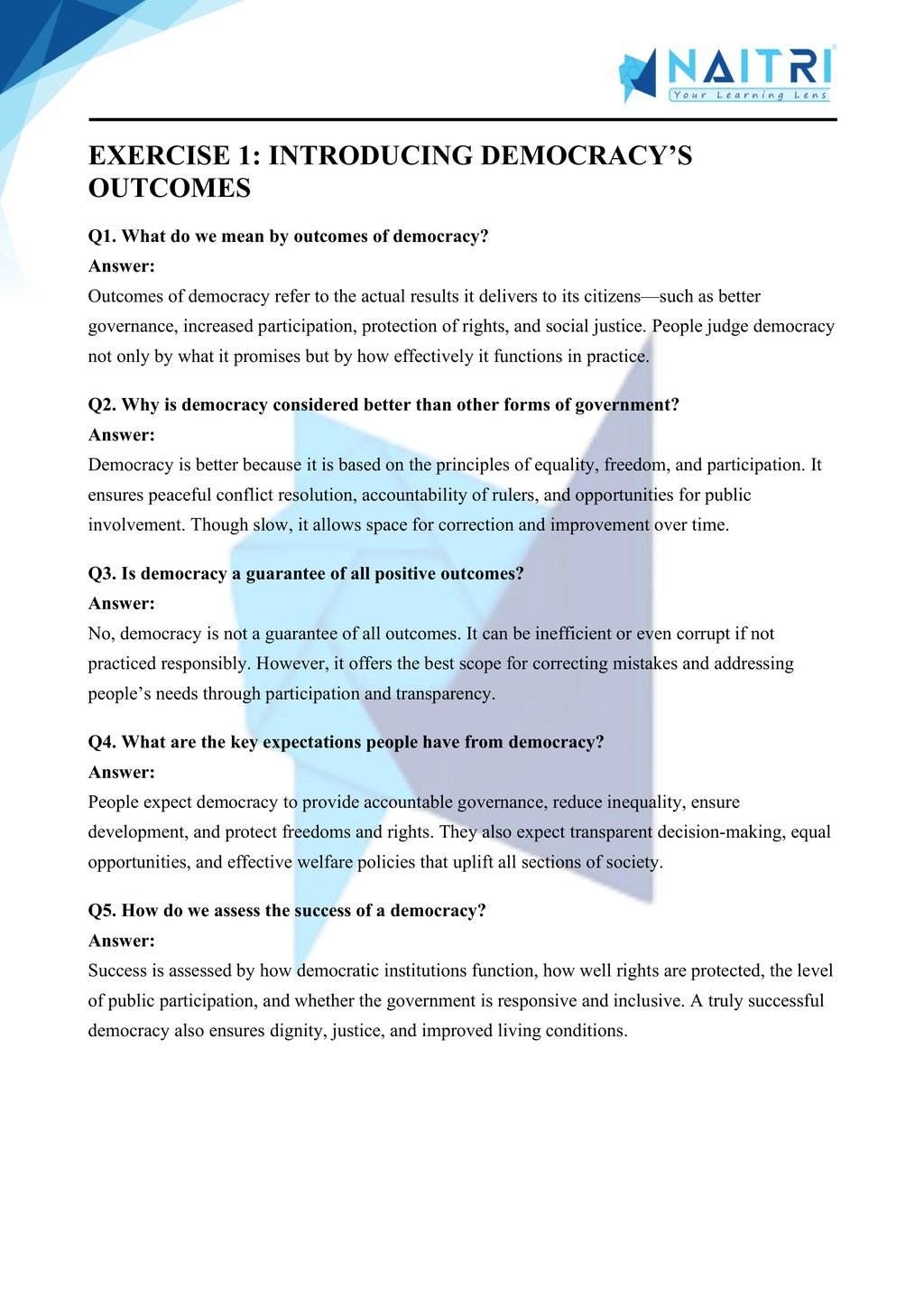
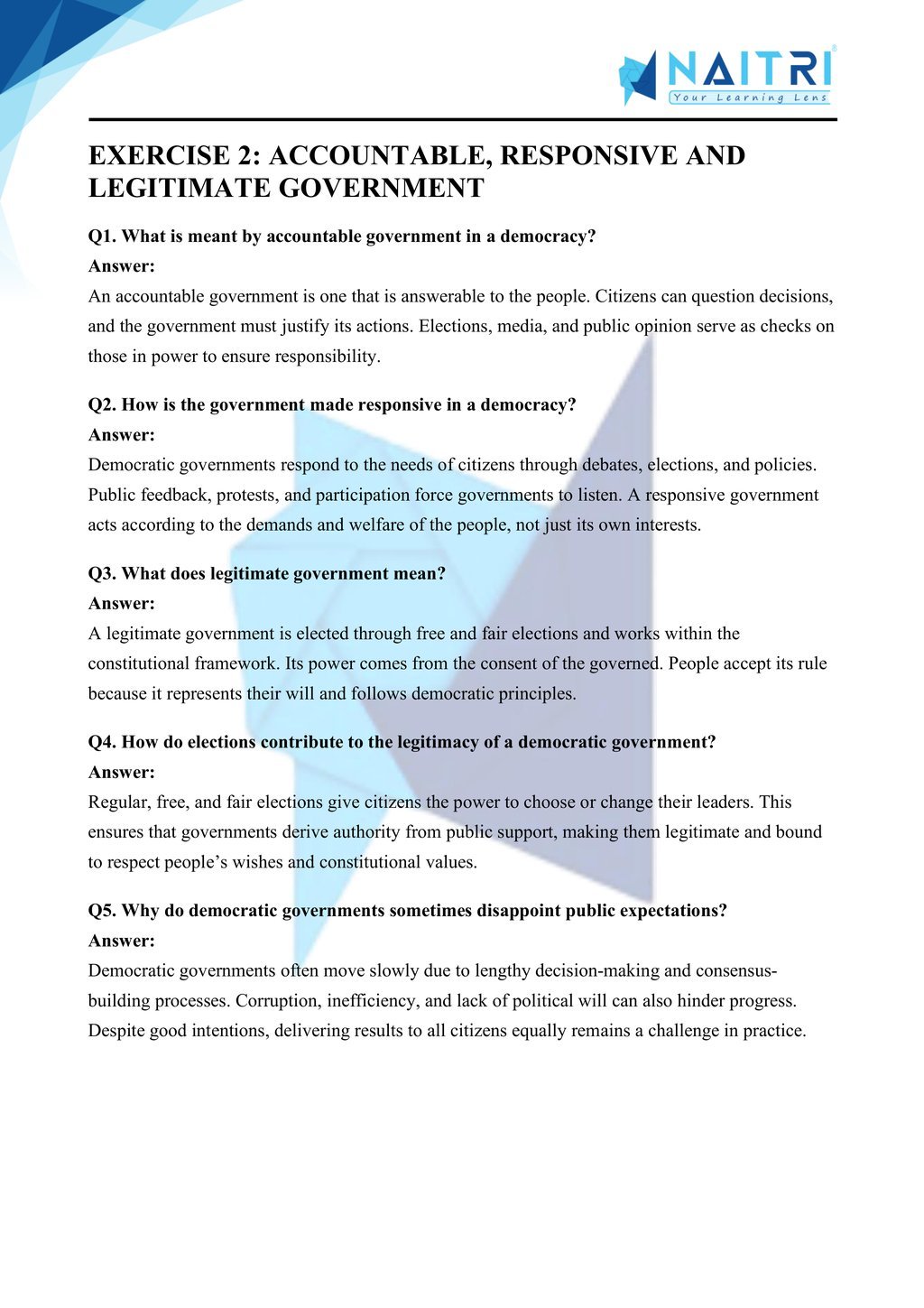
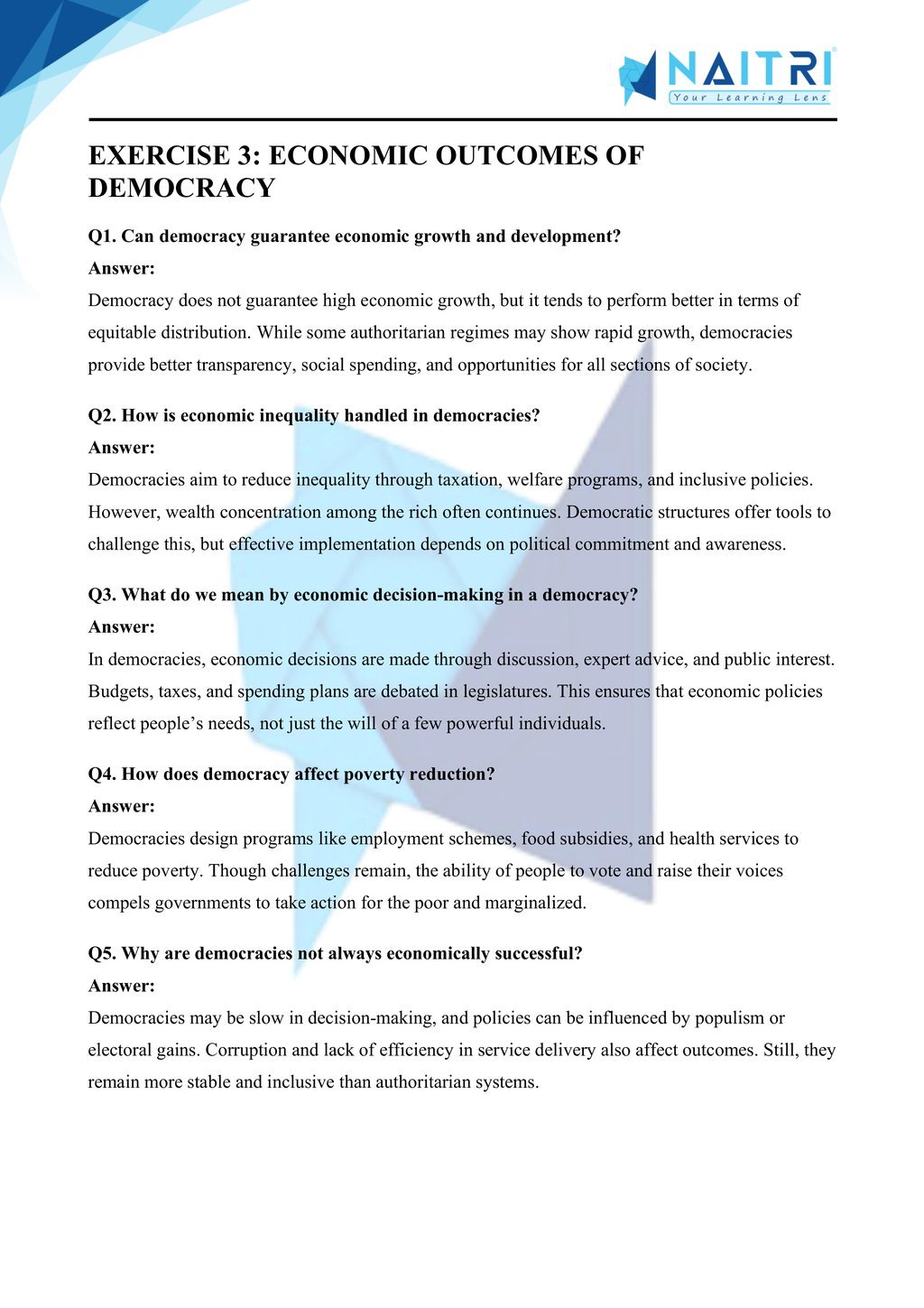
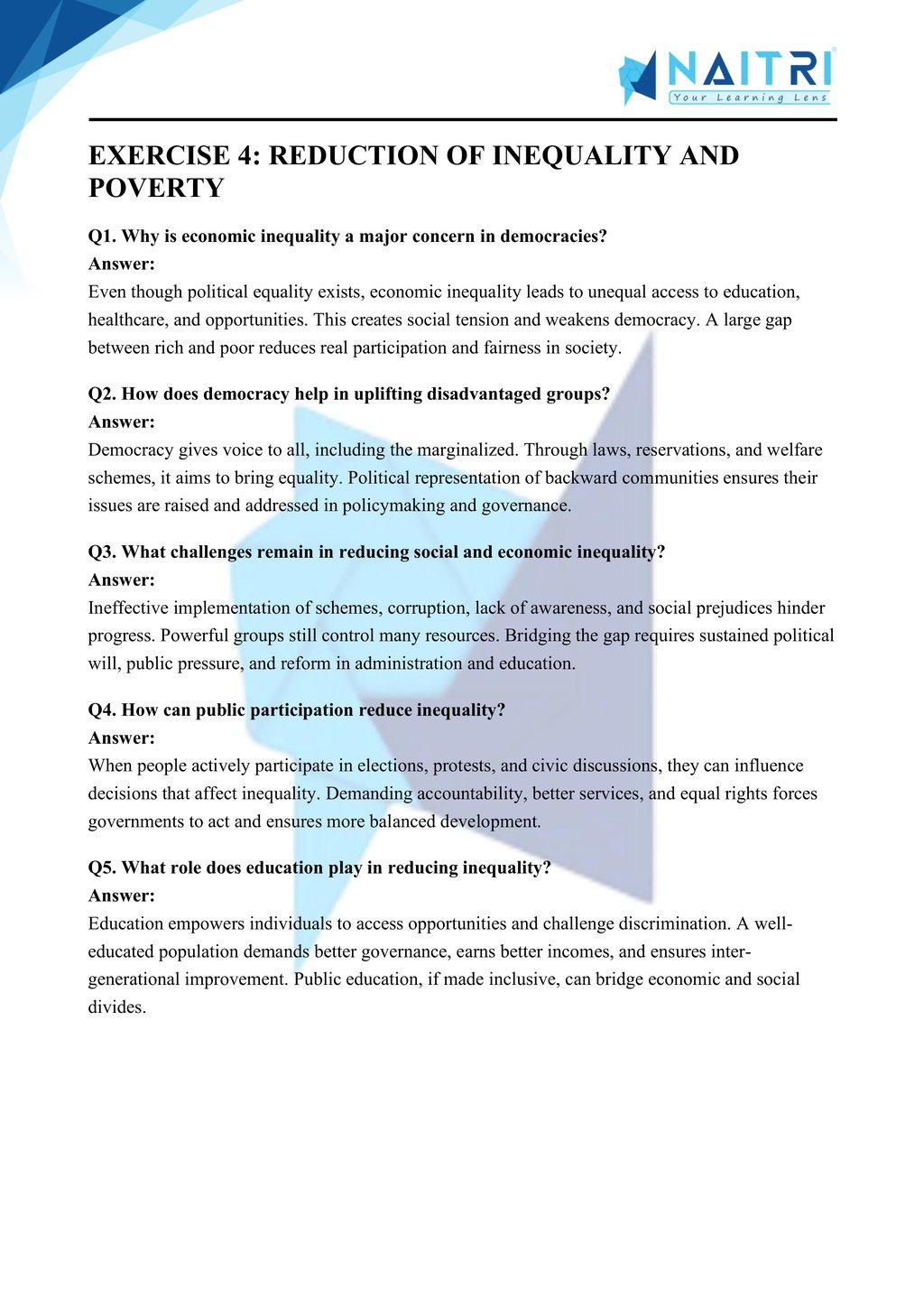
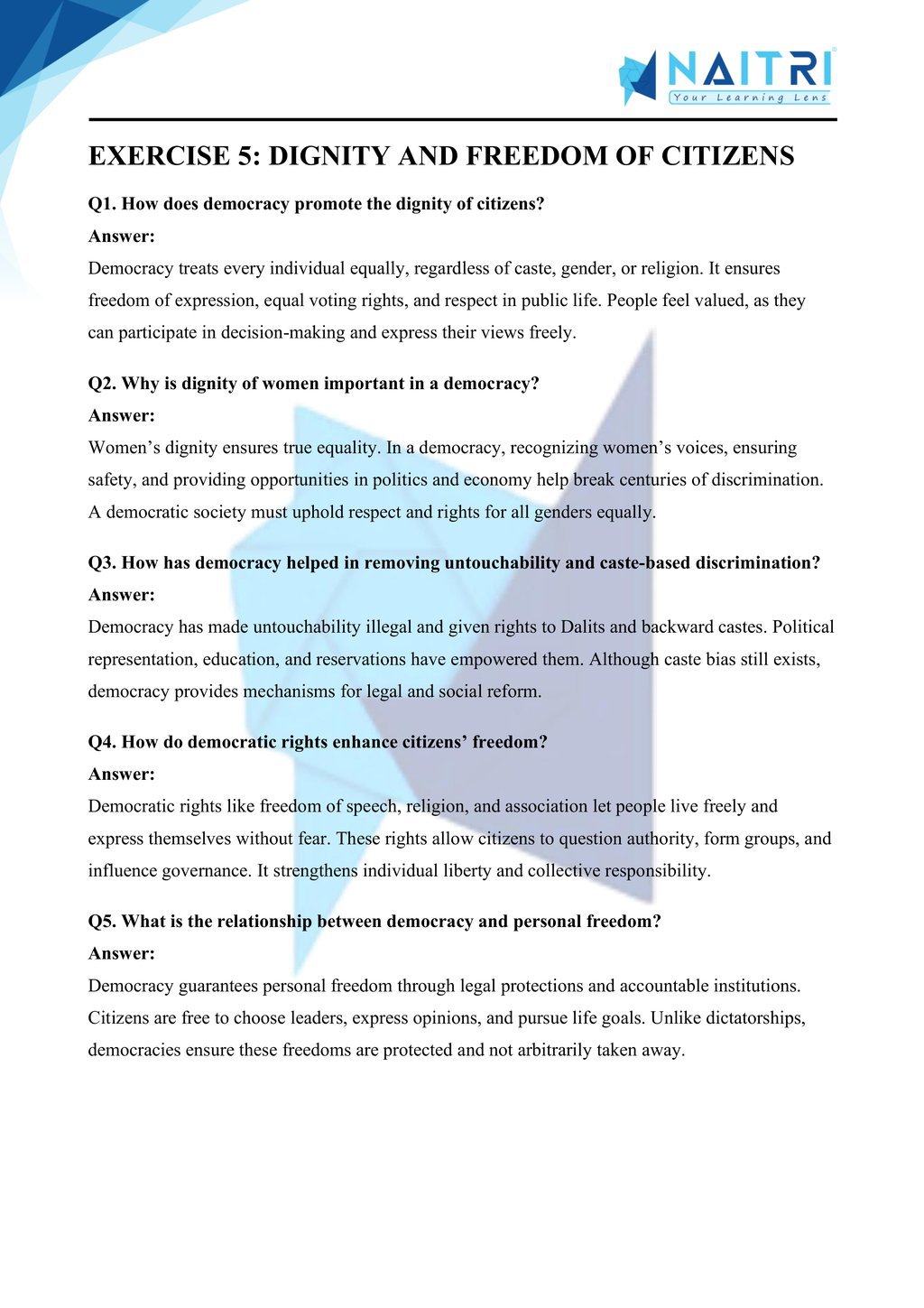
Experience Civics Like Never Before – With AR!
Understanding Outcomes of Democracy is now more exciting and immersive! With the NAITRI App, you can explore complex civics concepts through Augmented Reality (AR). Explore democratic performance measured, citizens empowered, and social justice delivered — right in front of you. Our AR-powered lessons make learning interactive, 3D, and fun, helping you retain concepts better and enjoy every topic.



Visualize . Interact . Understand . The future of learning is here
Outcomes of Democracy – Important Questions with Answers
What are the main outcomes expected from a democracy?
Answer: A democracy is expected to deliver responsive, accountable, and legitimate government, ensure social equality, economic development, and protection of rights and freedoms.How is democracy accountable to the people?
Answer: Democracy holds elected representatives responsible through regular elections, media, public opinion, and legal frameworks that check abuse of power.Why is transparency important in a democracy?
Answer: Transparency ensures that citizens are informed, government decisions are open to scrutiny, and public participation is encouraged in decision-making.Does democracy lead to economic growth?
Answer: Not always. Economic growth depends on multiple factors, but democracy often promotes stability, better policy debate, and investment-friendly governance.What is the relationship between democracy and development?
Answer: Democracies may not always grow faster but usually ensure more inclusive, people-centered development that reflects public needs and fairness.How does democracy reduce inequality?
Answer: By providing equal rights, affirmative policies, and laws against discrimination, democracy promotes equality of opportunity for all sections of society.Is economic inequality still a challenge in democracies?
Answer: Yes. While political equality exists, wealth concentration, unemployment, and lack of access to resources remain major challenges in many democratic countries.How does democracy promote dignity of citizens?
Answer: Democracy values individual dignity, freedom of expression, and equality, allowing citizens to live with respect, voice opinions, and challenge injustice.What are the political outcomes of democracy?
Answer: Democracies provide stable governments, peaceful transitions, legitimate rule, and allow space for criticism, opposition, and people’s voice in governance.How is democracy better than dictatorship?
Answer: Unlike dictatorship, democracy ensures freedom, regular elections, citizen rights, and the ability to question government actions without fear of repression.How do democratic governments ensure public welfare?
Answer: Democracies prioritize healthcare, education, infrastructure, and welfare schemes through representative policies and citizen participation in planning and feedback.Why are elections essential in a democracy?
Answer: Elections ensure accountability, allow citizen participation, and give the public the power to choose or reject their leaders.How does democracy accommodate diversity?
Answer: By recognizing cultural, linguistic, and religious diversity, and promoting inclusive governance, democracy prevents marginalization and promotes unity.What is meant by democratic government being responsive?
Answer: A responsive government listens to public needs, adjusts policies, and ensures timely action to address citizen issues and feedback.What is meant by legitimate government?
Answer: A legitimate government is constitutionally elected, follows legal processes, and governs with the consent of the people, making it accepted and respected.What are the limitations of democracy?
Answer: Decision-making is often slow, political competition may cause instability, and elected leaders may prioritize popularity over real development.How can democracy be strengthened?
Answer: Through active participation, strengthening institutions, promoting civic education, transparency, and holding leaders accountable for their actions and promises.What is the role of citizens in democracy?
Answer: Citizens must vote, stay informed, question government actions, and participate in public dialogue to keep democracy vibrant and functional.Does democracy guarantee social justice?
Answer: Democracy creates space for social justice, but full realization depends on implementation of laws, awareness, and social change.How does democracy improve decision-making?
Answer: It involves consultation, debate, and compromise, which may take time but often leads to more acceptable and inclusive decisions.Why are democratic governments considered more legitimate?
Answer: Because they derive power from free elections, follow constitutional rules, and are subject to public approval and legal accountability.What is meant by democratic reform?
Answer: It refers to improving functioning of democracy through changes like curbing corruption, increasing transparency, and encouraging participation and fairness.What is the impact of democracy on poor and marginalised sections?
Answer: Democracies aim to uplift the poor and marginalized through welfare schemes, legal rights, and representation, though implementation gaps often exist.How does democracy ensure freedom of expression?
Answer: It protects free speech, allows media independence, and lets citizens express views without fear, creating a culture of openness and criticism.Summarize the outcomes of democracy.
Answer: Democracy leads to accountable government, inclusive policies, respect for rights, dignity of individuals, better dispute resolution, and a system that values public opinion.
Outcomes of Democracy assesses how well democracies deliver on their promises. The chapter evaluates outcomes like quality of government, economic development, reduction of inequality, and dignity of individuals. It highlights that while democracies may not be perfect, they ensure accountability, public participation, and freedom. Students are encouraged to critically assess democratic performance using real-world data and experiences.
Related Chapters You May Like
Download Naitri App
Easy, Visual Learning — Right on Your Phone
Learn with Augmented Reality! The Naitri app makes CBSE and MP Board concepts interactive and fun — even in low-resource settings. Watch lessons, complete homework, take tests, and track progress — all in one place. Anytime. Anywhere.
Available on








